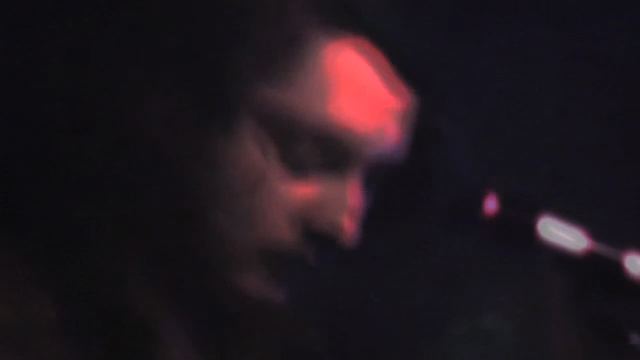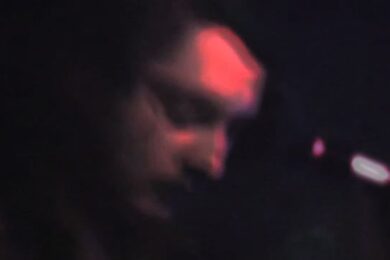Riding in on an enormous wave of reverberant static, swathed in analogue foam and squalling, trilling synths, Oneohtrix Point Never’s Returnal is one of this year’s real treats. Drifting ever further from the East Coast noise scene which spawned him, sometime Brooklynite Daniel Lopatin’s music draws on the discarded bric-a-brac of bygone decades – new age music, early synth experimentalism – to create an admirably non-ironic dialogue with our shared nostalgia (though there’s much more to the music than that).
In the followup to 2009’s Rifts (which itself was an amalgamation of three earlier albums and sundry bits and bobs), released on Carlos Giffoni’s No Fun label, Lopatin has taken a step further into his own monolithic, hyper-real world; and, in the process, stepped across the Atlantic onto Austria’s Editions Mego imprint. And while his music may stand apart from the austere volatility of much of the Mego canon, when it comes to articulacy, Lopatin is easily the equal of the old guard; his well-crafted, thoughtful musings on everything from commercialism to Jacques Cousteau populate the world wide web like fortune cookies for the hyper-digital age. No difference in this email correspondence, where Lopatin talks of his love for sub-par music and provides an explanation of how Returnal is his Henri Rousseau record.
How did you get into synthesisers?
Daniel Lopatin: My dad had a couple and I thought they were super futuristic.
Your music is very hardware-based, but you mentioned in a recent WIRE interview that making Returnal relied on heavy computer editing. Do you have any compunctions about the ‘purity’ or ‘authenticity’ of the technological medium you’re using?
DL: I don’t like either word at all re: purity and authenticity – I wish they’d be banned from the lexicon of taste. Art is all about making interesting choices at the right moment in order to yield something humane. What I meant by heavy computer editing is that unlike a track like ‘Time Decanted’ or ‘Russian Mind’ or ‘Parallel Minds’ or stuff like that, which is mostly one take, live mic’d or direct 1-2 track recordings, the material on Returnal is swathed in edits and a resampling technique that I had grown tired of in previous years and have come back to now.
Your music as OPN seems to have progressed from being audibly hand-played earlier on (relatively simple melodic arrangements in some of the Betrayed In The Octagon tracks, for example), to being very much machine-driven (arpeggiators, multiple loops, dense layering) on Returnal. Does that represent a change in focus, or more a refinement of technique? And is the physicality of playing a synthesiser important to you, or just the resultant sound?
DL: I’ve gotten better at producing since the last time I was doing that sort of heavy edit style electronic music, but essentially the technique is the same. What changes a lot for me is the sorts of sounds I find interesting. Physicality rules. All of my tracks start with straight-ahead jam sessions that are then sourced and put through certain technical rigors which are essentially about finding sweet spots with pitch and applying that towards the creation of a sonic arc or some sort of descriptive arc – for instance ‘Pelham Island Road’ is organized in a way that connotes to the actual road and the environment there. So the challenge is technical to some degree but is mostly rooted in the joy I get from mapping aspects of my life or the environment to that process.
A lot of your music is drenched in what sounds like analogue/tape distortion too. Is that a result of the equipment you use?
DL: Credit should be given to Al Carlson who is a childhood friend of mine and an engineer now in the city. He did a lot of the tape-op on Returnal. In other instances I’ve done a lot of bouncing down to cassette tape and recapturing. Al is much more thorough and has a few different portable reel to reel players which sound much better than my Panasonic handhelds.
Returnal, for me, evokes vast open spaces; which is an interesting parallel to the confines of the studio environment. Was that a conscious creative decision?
DL: Yeah it’s very much my Henri Rousseau record – in the sense that it is a hyper realised vision of open spaces based on ‘inauthentic’ scenarios. In other words, I’m not inspired by the Serengeti, I’m inspired by world music depictions of African expanses, and the sort of false authenticity of those depictions. As if Peter Gabriel has a handle on what the fuck is going on with FGM in Sudan. It’s ludicrous. On a track like ‘Preyouandi’, I’m attempting at least to make sense of my relationship to those sorts of musical practices, while retaining some of their melodic and aesthetic ideas that I’m so clearly drawn to.
Most of the tracks on Returnal have fades at the beginning and end, rather than concrete beginnings/endings. Could they go on forever if you wanted them to?
DL: I typically can say everything I want to say in about 3 to 8 minutes. I’m getting more interested in shorter pieces now.
In an age of ultra-compressed, radio-friendly mixdowns, how do you view the role of dynamics in your music? I’ve noticed that often one track will be noticeably louder or softer than the next (and ‘Nil Admirari’, for example, seems the obvious album-opener due to its volume and abrasiveness).
DL: Games uses a lot of compression but usually it’s in a manner as to sort of mangle the audio, not really to make it cleaner. ‘Nil Admirari’ had to be really agro to work. I wanted it to explode the way an old John Wiese track might. I tend towards static arrangements. Event-based experimental arrangements bother the fuck out of me. I feel like I’m listening to a musical. It’s too disruptive. I like long sexy arcs. I like vistas. That is clear.
Your music seems to exist in its own synthetic world. Does your location have an effect on your creativity? If so, how?
DL: I like to record in Massachusetts; there’s fewer distractions and I’m usually in a sort of state of constant yearning there, which is sort of a good head space for me to be in while recording.
I’d like to ask about the title of the album, Returnal. I see it as referring to our culture’s constant cycle of back-referencing, where artists and consumers look back to a shared cultural heritage to find inspiration. So it could be seen as a comment on the way society currently functions, or perhaps on your own creative method. Would you agree with that analysis?
DL: This is so true. The title was in part, a nod to my generation as anthropologists and archivists and curators. The title means a few things to me but yeah it’s partially about digging for bones and reliving the past as surrogates via mech-extensions such as the internet.
It could be argued that you’ve taken reference points which some considered cultural dead-ends – new age music, cheap 80s synth movie soundtracks – and revitalised them for 21st Century ears. To what extent is your music consciously about resuscitating old cultural objects? Or is that an unconscious by-product of your creativity?
DL: I’m certainly aware of it, and I think that approach really yielded a certain intensity and urgency from which I really had a gigantic creative streak a few years ago, but I wouldn’t say it’s exclusively about that. In other words it’s not like I sit in my room thinking of ways to cleverly re-appropriate some sort of lost music. But I do find that music which is often considered second grade or sub-par or has fallen by the wayside for whatever reason – that music often speaks to me and informs me on a level that goes beyond music itself. It’s humane. It exists in the world along with everything else and I often have the urge to understand or meddle with it.
Do you feel plugged in to the ’80s cultural revival which seems to have come into full force in the last few years?
DL: I’ve benefited from the zeitgeist but I don’t feel plugged in. I feel like someone on a mission to make the music of my mind, and that has very little to do with other people’s music – in fact I try to avoid a lot of music that is in a similar vein to mine because I believe deeply in the viral nature of mimetic stuff and I am very easily influenced by things I hear. So the less I know about what’s going on the better.
Finally, does your music have a function for you? To meditate to? To take drugs to?
DL: I don’t like to listen to my own music beyond the mastering phase really at all. But I love the moment of creation when you’re totally in the thick of it and listening to your jams and falling in love. It feels like the excitement of love or infatuation or something like that.



